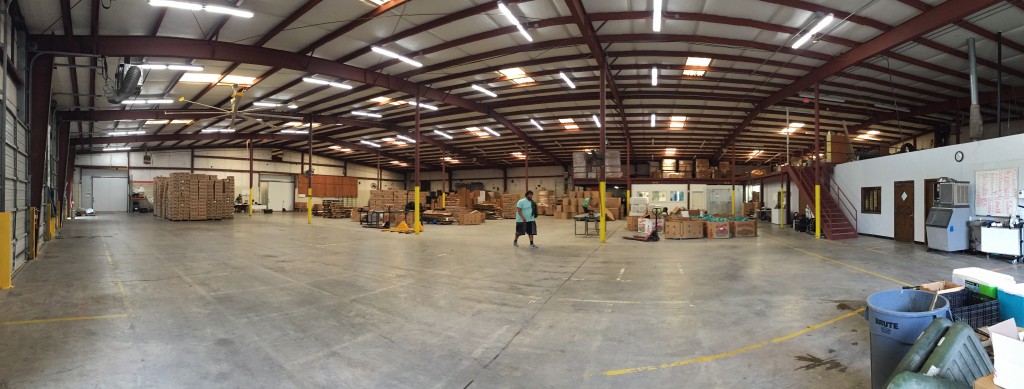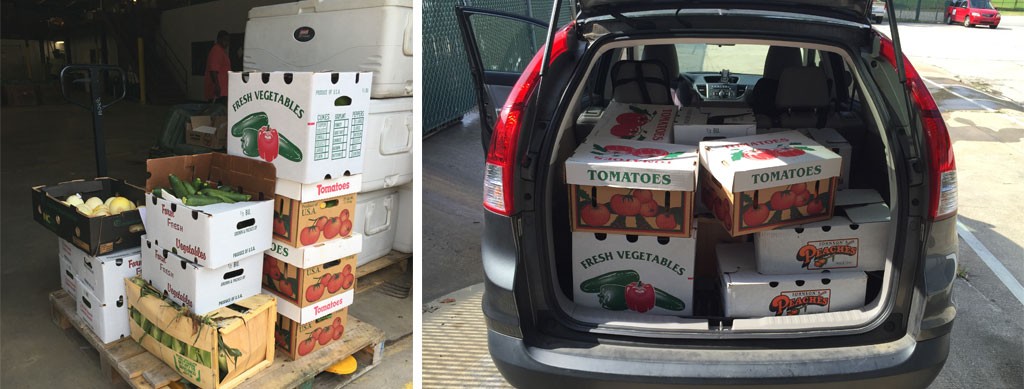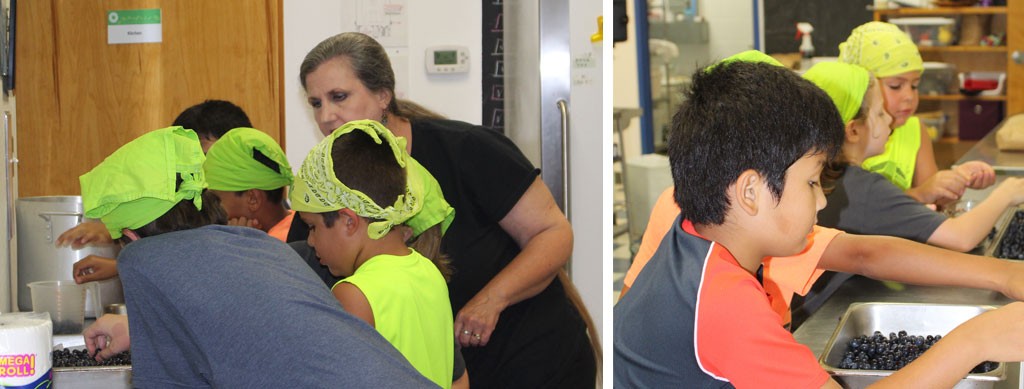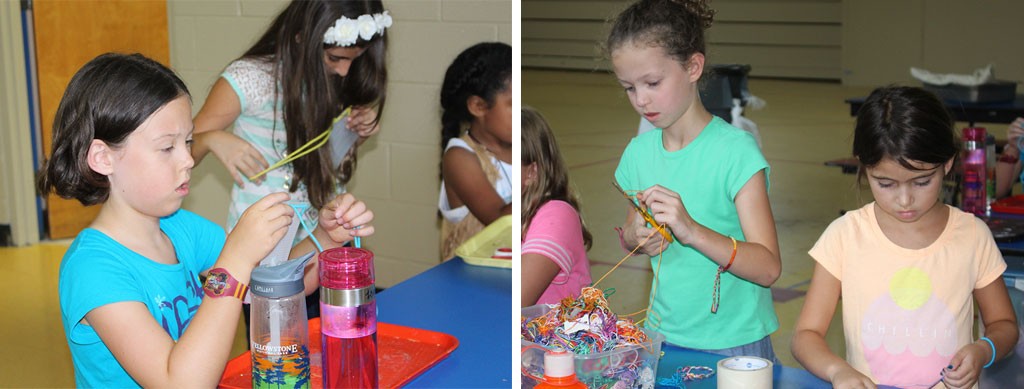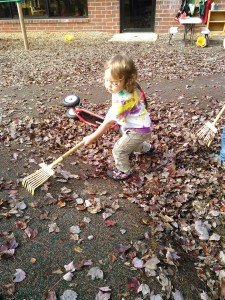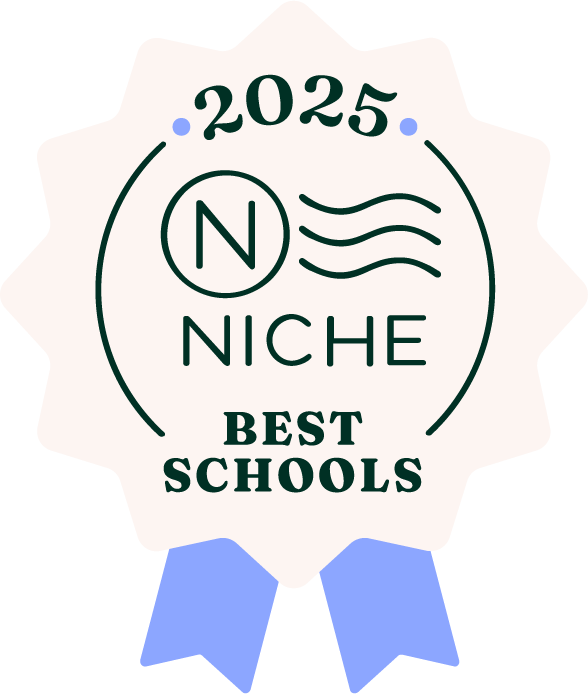Greensboro Montessori School has announced two major changes that will launch in fall 2017: 1) The expansion of its middle school to include ninth grade and 2) The transition of sixth grade, previously a part of Greensboro Montessori’s middle school, to the School’s upper elementary division. Both changes will enable the School to more authentically deliver the Montessori experience for both students and faculty, a hallmark of which is three-year, multi-age groupings within each division.
The three-year groupings that will result—grades four, five and six in upper elementary and grades seven, eight and nine in middle school—are consistent with the pivotal three-year cycle first articulated by educator Dr. Maria Montessori (1870–1952) and later supported by the American Montessori Society, of which Greensboro Montessori is an accredited school member.
Montessori’s three-year cycle recognizes sensitive periods of growth and development shared among each age group. It also allows for skills and concepts to be introduced, explored and mastered through three consecutive and collaborative years of learning.
Commenting on the addition of ninth grade to Greensboro Montessori’s offerings, Associate Head of School Nancy Hofer said: “As researchers and educators increasingly refer to ninth grade as the make-or-break year of high school, Montessori methodology changes the conversation by positioning ninth grade as a capstone year in middle school. Young adolescence is a monumental time in the life of a child. Rather than lead every student down the same path, the Montessori philosophy empowers us to look at each student individually and develop a custom learning plan to unlock his or her full potential. Offering ninth grade to our students and their families is just another way Greensboro Montessori School supports this philosophy in both theory and practice.”
Richard A. Ungerer, the American Montessori Society’s Executive Director, added: “Greensboro Montessori School is one of only six AMS-accredited schools in North Carolina, and it is the only AMS-accredited school in the state’s Piedmont Triad region offering middle school. We are thrilled to see their commitment to the continued process of self-reflection and school improvement that is a critical part of what it means to be AMS-accredited. And by introducing these curriculum shifts, the School reaffirms its commitment to developing the whole child through the time-tested, research-based educational approach of Maria Montessori.”
Greensboro Montessori will graduate its first ninth grade class at the end of the 2017-18 school year. To inquire about enrollment at Greensboro Montessori, please contact Rhea Egbert, director of admission.
This summer I've been introduced to Montessori Market, a summer camp Greensboro Montessori has offered for the last 17 years. Through a unique blend of environmental education and hands-on learning, campers participate in a week-long business preparing consumer goods for sale to the general public at the conclusion of camp. Just as our 2016 graduating class impressed me, Montessori Market has revealed yet another School tradition which is so much more than meets the eye.
Montessori Market is an all-hands-on-deck camp featuring contributions from the entire school community. Whatever produce we can't harvest from our own permaculture gardens, we source from local farmers. Both faculty and students work together to gather ingredients before camp even begins. This year, Nancy Hofer, Mary Jacobson, Kristy Ford and Andi Bogan chaperoned our Lower Elementary Al Fresco summer camp students to a local blueberry farm where they hand picked blueberries for jam. We also needed peaches which led me to think about The Produce Box, a service which delivers fresh produce from North Carolina farmers to my doorstep each week. After one quick trip to Raleigh and the overwhelming generosity of The Produce Box, we had boxes of peaches, certified organic zucchini, green bell peppers, corn, jalapeños and tomatoes.
The students began camp with a full refrigerator of fresh, North Carolina-grown produce and three sprawling gardens from which to pick fresh basil for pesto and lavender for sachets. They have also made a wide variety of handmade crafts to accompany their foodstuffs.
As the students approach the end of the week, the most beautiful and compelling aspect of camp comes alive. With finished goods ready for sale, you have to wonder, "for whom and to whom will they sell their goods, and where?" I've since learned that Montessori Market has always worked for the benefit of children in need. Campers wake up bright and early to sell their products at the Greensboro Farmers Curb Market on the Saturday immediately following camp, and all proceeds are donated to a charity focused on kids. Hence, it's time to introduce BackPack Beginnings.
Founded six years ago by Parker White, a new mother at the time, BackPack Beginnings' mission is to deliver child-centric services to feed, comfort, and clothe children in need in Guilford County. By ensuring food and basic necessities are given directly to children in need, BackPack Beginnings makes a positive and lasting impact on their health and well-being. As a 100% volunteer organization, BackPack Beginnings serves over 6,000 children experiencing hunger and trauma in our community annually. Recently, Parker has been named one of four finalists for The NASCAR Foundation’s Sixth Annual Betty Jane France Humanitarian Award presented by Nationwide. This award honors incredible volunteers from across the country who have made a profound impact on children’s lives in their community. (You can vote for Parker daily from now until September 26; if she wins, The NASCAR Foundation will make a $100,000 donation to BackBack Beginnings.)
Our Montessori Market campers have been learning, cooking, and collaborating on behalf of BackPack Beginnings all week. This Saturday, July 30, they will be at the Curb Market proudly displaying their finished goods, and a donation to BackPack Beginnings will allow market-goers to shop from their products. In addition to the pesto and sachets, shoppers may also select from blueberry jam, peach jam, salsa, zucchini bread, and a number of homespun crafts.
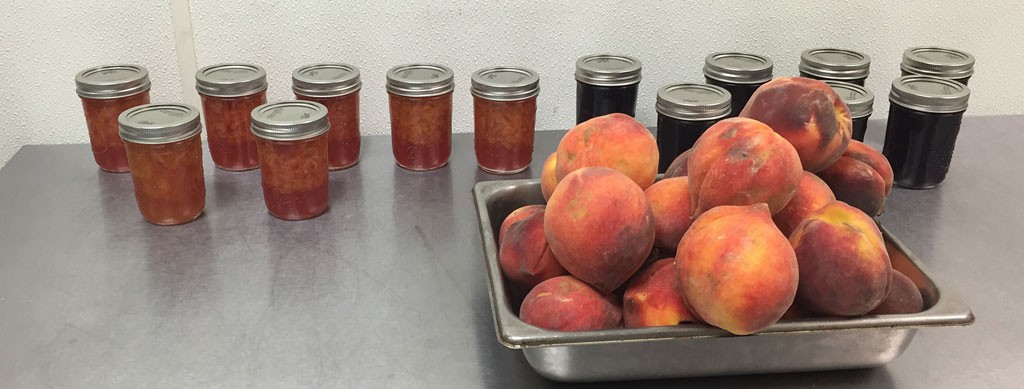
Peach and blueberry jams—lovingly made by students participating in Montessori Market—ready for display at the Greensboro Farmers Curb Market.
100% of the donations received on Saturday will assist the BackPack Beginnings' Food BackPack Program which helps fight childhood hunger in our community by filling the weekend food gap for children in need. By the numbers, this program sends 1,600 children from 26 schools with fresh food each weekend totaling 6,400 food bags per month. This effort is in addition to their Comfort BackPack, Food Pantry and Clothing Pantry programs. While our hope is that we receive enough donations on Saturday to empty our booth, any remaining products can be directly donated to BackPack Beginnings for direct inclusion in Food BackPacks or the Food Pantry.
So this is the story of how a summer camp evolves into so much more than a summer camp. How the Montessori philosophy challenges us, as adults, to push our kids to do more than text, snapchat and Netflix during summer break. How engaged faculty and community organizations prepare children for a lifetime of success by providing real-world experiences in running a business, manufacturing, time management, and philanthropy. And how children come together to help others less fortunate than themselves. And how Montessori Market is more than meets the eye.
My first day at Greensboro Montessori School was Tuesday, May 31, which was also the day of our Council of Elders interviews with our graduating middle school students. The week that followed was a crash course in the rich experiences exclusive to our students contrasted with the universality of adolescence…and most notably, the extraordinary academic and social accomplishments of students who have learned under the Montessori method of child-led education.
As I walked to Susana D’Ruiz’s Spanish classroom for my Council of Elders interviews, I quickly noticed how comfortable I felt in our middle school hallways. Down the main corridor, one side was lined with lockers, a familiar scene from any middle school in the country. And as I met with the interviewing graduates, I was immediately transported to middle school years when each moment swung along a pendulum between my own teenage angst and hubris.
But this group displayed a wealth of life experiences I never knew at 14:
- They had run their own businesses during Greensboro Montessori School’s holiday marketplace, not once, but three separate times in each of their years in middle school. This repetitive format allowed them to learn and improve their business acumen from one year to the next.
- They had traveled extensively studying U.S. government in Washington D.C.; visiting Biosphere 2 in Oracle Arizona; participating in the United Nation’s Global Citizen Action Project in New York City; and living with host families from The Summit School in Costa Rica.
- They had cared for a baby (albeit, a mechanical one) for a weekend, with dashed hopes of sleep as they tried to determine whether their baby needed to be changed, burped, fed or rocked. Any many had to pay their parents to babysit in order to maintain extracurricular commitments in sports and music.
- They had completed an introspective “Who Am I” project which had unlocked a fresh sense of confidence and creativity as they prepared for the leap to high school.
- They lived Survivor-style at Greensboro Montessori School’s 40+ acre Land Lab where they cooked their own food, slept in shelters built by students and hauled their own fresh water. Divided into tribes, they experienced life without electricity and gained a deep appreciation for social and environmental responsibility.
But the graduates’ accomplishments extended well beyond these experiences, a point that came full circle for me when I attended their graduation ceremony.
The three-and-a-half-hour celebration featured heartfelt, personal introductions of each student from a faculty member of the graduate’s choosing. After each introduction, the respective graduate gave a speech. This combination – faculty introduction and graduate speech – repeated itself sixteen times yet was never boring or monotonous. It was deeply revealing about the extraordinary bond that results when faculty invest just as much heart and soul into their students as their students put into their work. The result of faculty who understand their students’ so well that they enable each one to reach his or her full potential.
And the academic results are astounding:
- Two of our graduates will attend the Early College at Guilford, which U.S. News and World Report just ranked the top high school in North Carolina, and they only accept 50 new students a year. When you look at the numbers, Guilford County Schools has 23 middle schools and a host of other private schools. With 16 eighth graders, Greensboro Montessori Schools represents a fraction of a percent of eighth grade enrollment in this county, but we represent 4% of the Freshman class at the best high school in the state.
- Five of the graduates will attend the Weaver Academy for Performing and Visual Arts where they will follow a “rigorous curriculum comprised of Honors and Advanced Placement courses” while also following a “specified course of study in their performing and visual arts area of concentration.” One of our graduates will concentrate in dance. Another in music – the drums specifically, and yet another in visual arts. The other two were accepted into the music production concentration, open to only nine new students a year.
- One of the graduates will attend Rabun Gap-Nachoochee School, a college preparatory day and boarding school with a “100% college acceptance rate and placement includes the nation's most selective institutions including Harvard, Princeton, Duke, Brown, and Emory as well as highly regarded colleges and universities both domestic and abroad.”
- Four of four graduates who will attend Grimsley High School were accepted into the International Baccalaureate (IB) Programme, a course study known for academic excellence, rigor and achievement. Students who graduate with an IB diploma often enter college with advanced standing from course credits earned in high school.
This list highlights just over half Greensboro Montessori School's Class of 2016. In all, our graduates will attend eight distinguished secondary institutions including those listed above and the American Hebrew Academy, Bishop McGuinness, Northern Guilford High School and Salem Academy.
As I begin to settle into my new role, I’m humbled by the success of these young adults 20 years my junior and feel a deep responsibility to shine a light on this magical place. A place where academic brilliance lives concurrently with Montessori methodology, two concepts that many mistakenly, and for us Montessori educators, might I add painfully, assume are mutually exclusive.
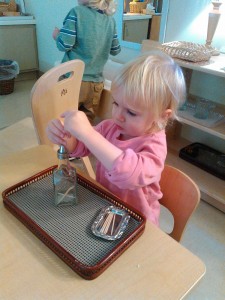 A toddler is seated at a small table, carefully guiding a toothpick through the tiny hole in the top of an oil & vinegar shaker. Beside him, a classmate carefully pours water into a vase before adding a few small stems of flowers. Nearby, a teacher and children use blunt slicers to prepare cucumbers for the morning snack. Scenes like these are hallmarks of the Montessori toddler classroom, and look quite different from many other early childhood settings. To the unaccustomed eye, the purpose of these activities, cobbled together from seemingly random household items, can be difficult to discern. But upon close inspection, one notices that the first child holds the toothpick with a grasp closely resembling the pencil grip he'll eventually master. His classmate is developing focus and concentration as the flowers engage her senses of sight, smell, touch, and aesthetic awareness. And those involved in the preparation of the healthy snack are now inclined to sample it themselves.
A toddler is seated at a small table, carefully guiding a toothpick through the tiny hole in the top of an oil & vinegar shaker. Beside him, a classmate carefully pours water into a vase before adding a few small stems of flowers. Nearby, a teacher and children use blunt slicers to prepare cucumbers for the morning snack. Scenes like these are hallmarks of the Montessori toddler classroom, and look quite different from many other early childhood settings. To the unaccustomed eye, the purpose of these activities, cobbled together from seemingly random household items, can be difficult to discern. But upon close inspection, one notices that the first child holds the toothpick with a grasp closely resembling the pencil grip he'll eventually master. His classmate is developing focus and concentration as the flowers engage her senses of sight, smell, touch, and aesthetic awareness. And those involved in the preparation of the healthy snack are now inclined to sample it themselves.- Promote a sense of pride and ownership in the classroom environment.
- Enable children to interact with real-world objects, mastering the use of tongs, juicers, tweezers, rakes, basters, and other implements they'll encounter for the rest of their lives.
- Enhance physical coordination, promoting both large and small muscle development.
- Build independence and self-esteem by providing toddlers opportunities to care for themselves.
- Convey a sense of trust between caregivers and children, communicating that we see them as capable and worthy of using the real tools, kitchen devices, and other household items they long to explore but are often forbidden.
- Allow children the gratification of completing a defined task from start to finish.

